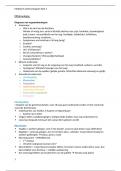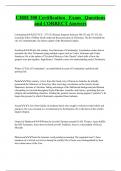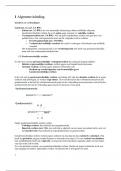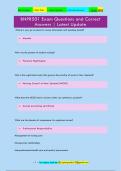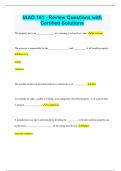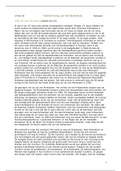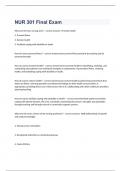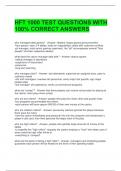Issues
Noa Kreike, University of Amsterdam, 2022
Inhoud
Lecture 1.................................................................................................................................................3
Toates, F. How Sexual Desire Works - Chapter 2 Explaining desire....................................................3
The ‘here-and-now’: broad principles............................................................................................3
Some basic psychology...................................................................................................................3
Insight through comparison with other desires..............................................................................3
Evolutionary perspectives...............................................................................................................4
Toates, F. How Sexual Desire Works - Chapter 9 Arousal...................................................................4
Anecdotal evidence on general arousal and its spill-over...............................................................4
Sexual arousal, experimental evidence and theories.....................................................................4
What is sexual arousal?..................................................................................................................5
Objective and subjective arousal....................................................................................................5
The link with desire.........................................................................................................................5
Lecture 2.................................................................................................................................................6
Toates, F. (2022) A motivation model of sex addiction.......................................................................6
Graham et al. (2017) Women’s sexual desire: Challenging narratives of “dysfunction”.....................7
Van Anders et al. (2022) The Heteronormativity Theory of Low Sexual Desire in Women Partnered
with Men............................................................................................................................................8
Laan et al. (2021) In Pursuit of Pleasure: A Biopsychosocial Perspective on Sexual Pleasure and
Gender..............................................................................................................................................10
Introduction..................................................................................................................................10
Current gender differences in experienced sexual pleasures and displeasures............................10
Capacity for sexual pleasure.........................................................................................................10
Opportunities for sexual pleasure................................................................................................10
Evolution or culture......................................................................................................................11
Lecture 3...............................................................................................................................................12
Hyde & Delamater (2017) Understanding Human Sexuality: Gender Roles and Stereotypes..........12
Gender differences.......................................................................................................................12
Transgender issues and experience..............................................................................................13
Hyde et al. (2019) The Future of Sex and Gender in Psychology: Five challenges to the gender
binary................................................................................................................................................13
1
, The Challenges from Neuroscience..............................................................................................13
The Challenges from Behavioural Neuroendocrinology...............................................................14
The Challenges from Psychological Research: Gender Differences and Similarities.....................14
The Challenges from Psychological Research with Transgender and Nonbinary Individuals........14
The Challenges from developmental Psychology.........................................................................14
Costs, New View and Implications................................................................................................15
Reilly (2019) Gender can be a Continuous Variable, not just a Categorical one...............................15
Cretella et al. (2019) Seks and Gender are Distinct Variables Critical to Health...............................15
Eagly & Wood (2013) The Nature-Nurture Debates: 25 Years of Challenges in Understanding the
Psychology of Gender.......................................................................................................................16
Historical Trends In Research on Sex Differences and Similarities................................................16
Methodological Innovations.........................................................................................................16
Examples of the Yin and Yang of Nature and Nurture..................................................................16
Interactionist Theories That Integrate Nature and Nurture..........................................................17
Implications of Research on the Psychology of Gender................................................................17
Lecture 4...............................................................................................................................................17
Sailofsky (2022). Masculinity, Cancel Culture and Woke Capitalism: Exploring Twitter Response to
Brendan Leipsic’s Leaked Conversation............................................................................................18
Lecture 5...............................................................................................................................................19
Davy (2015) The DSM-5 and the Politics of Diagnosing Transpeople...............................................19
Introduction..................................................................................................................................19
Diagnostic and Political Shifts.......................................................................................................19
Politics of Citation.........................................................................................................................19
Rehearsing the Clinical Narrative..................................................................................................19
Claiming an Intersex Embodiment................................................................................................20
Self-Determination as Political Praxis...........................................................................................20
Zucker et al. (2013) Memo Outlining Evidence for Change for Gender Identity Disorder in the DSM-
5........................................................................................................................................................20
Antecedent Validators..................................................................................................................21
Concurrent Validators...................................................................................................................21
Predictive Validators.....................................................................................................................21
Lecture 6...............................................................................................................................................22
Reed (2002) Criteria for Evaluating Treatment Guidelines...............................................................22
Treatment Efficacy (systematic and scientific evaluation of whether treatment works)...............22
Clinical Utility (applicability, feasibility, and usefulness of intervention)......................................23
The Guideline Development Process.............................................................................................24
2
, References............................................................................................................................................25
Lecture 1
Toates, F. How Sexual Desire Works - Chapter 2
Explaining desire
The ‘here-and-now’: broad principles
Desire can be monitored in biologically and psychologically. Dichotomy of desire: Some people
believe that only subjective ratings of desire are worthy, and others believe that desire should be
measured solely objectively (e.g. looking at brain activity). These positions are rejected, processes in
the mind have corresponding processes in the brain. Even if the initial cause of lack of desire is
biological, the person experiencing the lack of desire will experience this psychologically as well. The
other way around, a psychological cause can have an effect on a biological level. E.g. depression as
the psychological cause of loss of desire. There can be discussion about the responsibility and blame
when it comes to sexual violence, especially when the deviant behaviour has a biological basis.
Some basic psychology
There is a distinction between automatic and controlled processes. Automatic processes, like walking
or reflexes, are unconscious. This gives more space to consciously perform controlled processes, like
having a conversation or navigating in an unfamiliar environment. Within a process, a person can also
switch between automatic and controlled.
- Habituation: “decline in the intensity of a reaction after repeated exposure to a particular
stimulus when there is no important consequence”.
- Incentive: a cue/thing that motivates to do something.
Classical conditioning is applicable in sexual desire when a cue motivates sexual arousal. An example
of such an incentive value is a certain odour. Instrumental conditioning is applicable in sexual desire
when a reward reinforces the behaviour. An orgasm is an example of a positive reinforcement. It will
increase the behaviour, sex. A negative reinforcement, removing something less enjoyable, also
increases the behaviour.
Insight through comparison with other desires
Dopamine systems play a role in craving and desire. Just like other desires, people tend to go for an
immediate small reward instead of a later larger reward. This is the same as hungry people that go
for a small immediate meal, instead of a larger meal at a later time.
Sex and feeding are different from one another, since feeding is necessary to survive. There are
however similarities:
- They can be associated with desire, and this desire varies tremendously between people.
- Variety is important for desire, and some are better at restraining from this desire
- Stress may be a trigger
- It can lift moods
Similarities between sex and drugs:
- Improve mental states (relieve from anxiety/stress)
- Being high vs orgasm
3


